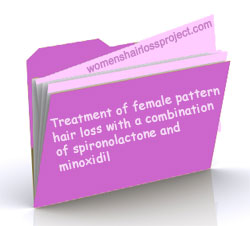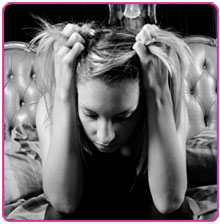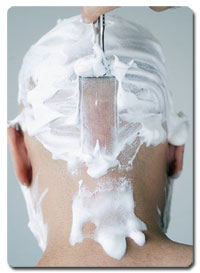 So I’m sure many ladies have already run up against the issue of having difficulty in getting Aldactone (brand name for Spironolactone) prescribed to them. Not all doctors are aware that this drug is used to treat androgenetic alopecia, and most of the ones I have met refuse to prescribe it at all, or in a dosage sufficient to actually potentially be of any help.
So I’m sure many ladies have already run up against the issue of having difficulty in getting Aldactone (brand name for Spironolactone) prescribed to them. Not all doctors are aware that this drug is used to treat androgenetic alopecia, and most of the ones I have met refuse to prescribe it at all, or in a dosage sufficient to actually potentially be of any help.
After a recent visit to a local dermatologist I left feeling smaller than slug, completely deflated, misunderstood and humiliated. My current prescribing physician is not local, and I was hoping to find someone close to home that would provide me with the prescription I need to help keep my hair from falling out of my head.
A few months ago my fiance went to a local dermatologist, and while there he thought to ask if he prescribes Aldactone to female patients with hair loss. The doctor stated a resounding “Yes,” and seemed to be fully aware of the potential benefits of it for hair loss and for hirsutism. So knowing this, I make a visit there in the hopes of leaving with a prescription for 200mg (100mg/ 2x day) of Aldactone, that is after all what I currently take. I even went to the appointment armed with my existing prescription bottle to prove that I am in fact currently taking this.
To make a long story short, the nurse and the doctor were completely shocked at the dosage, telling me “That is way too much!” and that they only prescribe 25mg, or tops 50mg. What? They then proceeded to ask me if I’ve ever had any blood work to determine what is causing my hair loss. Well gosh darn, why didn’t I ever think of that? I’ve only had every blood test known to man done a 100 times over. The doctor then continues to tell me that this is the culprit of my dry skin, when in reality I’ve had eczema and dry skin my entire life. I try and explain my situation, my 11 years of hair loss and that for 10 of those I’ve been taking Aldactone and that ceasing to take it now would cause a tremendous hair shedding, and at the thinness where it is now, that would leave me with basically no hair. I’m the first to admit that I don’t like taking this drug, I hate it, in fact I’ve written on numerous occasions that I feel like a prisoner to it. My saving grace is knowing that once I make the choice to wear a bonded lace hair system that I’ll ditch the meds and be done with it, but that time isn’t now.
The doctor then suggested we try 100mg. 100mg? I let the doctor know at that dosage my hair will shed. How do I know this? Last year I tried to wean myself off the Aldactone and guess what? My hair shed.. a lot. I guess I probably looked super pathetic and desperate in that doctor’s room since he decided to go ahead and have the nurse write me a prescription for it. The doctor leaves and a short while later the nurse who is in the room with me still, says “I don’t care what you say, you have to get off that, it’s not good for you” and she didn’t say it in a caring way, it was a stern rude way. Of course this is coming from the woman who is probably in her 50’s and has never lost a hair in her life. How easy to judge when you sit there with a full head of perfectly coifed hair. And my favorite part of the whole conversation comes next, she then says to me, “Well, what do you think is causing your hair loss?” Yes you read that right, that is exactly what she asked me in her cold harsh way. Well lets see, hummmm bad genetics? the Loestrin FE pill? A curse? You take your pick. I just told her it’s genetic, that’s it, nothing more to it. I can treat it, glue it, or let it fall out. Those are my options.
I could feel my face getting red, and my eyes feeling like the ocean was about to pour out of them. I couldn’t get out of there fast enough, once I got to my car I burst out into hysterical tears.
That day was just another reminder of how much suffering hair loss has caused me, it’s not bad enough that this is happening, but I have constantly been confronted with doctors that have no compassion or understanding and who fail to do one simple thing… LISTEN. On multiple occassions I have asked the various doctors I have seen to prescribe me the Aldactone and they all look at me like I was asking them for crack. Actually it probably would have elicited less of a reaction if I’d asked for crack. The doctors are usually aghast that I would be taking such a dosage, their reactions make me feel like I am taking arsenic.
Anyways this rant is something I had to get off my chest. I would love to get a list of doctors together that do prescribe Aldactone at the higher dosage levels of 100mg – 200mg / day. Does your doctor prescribe it? If so, please share the name and location of your doctor because I know I am not alone in my struggles to find a doctor that can support my hair loss treatment decisions without making me feel like a piece of garbage in the process.
{ 114 comments }
 I got an email from Tracy regarding a post she found on another website about a woman writing about her success with Spironolactone, so I’m posting it here for all of you. Thanks Tracy for this great find!
I got an email from Tracy regarding a post she found on another website about a woman writing about her success with Spironolactone, so I’m posting it here for all of you. Thanks Tracy for this great find! So I went to a new derm, who diagnosed me with telogen efluvium AND androgenetic alopecia, for which he is going to prescribe me Spiro (sorry can’t spell the full name) and Minoxidil, however I told him about my misfortune with taking Minoxidil previously and he said well then just take the Spiro, 50mg (IMO I need 200, because I have less than a fifth of my original hair left). I appreciate that there is already a lot of info in this site with regards to Spiro, but can anyone specifically answer me these questions please?
So I went to a new derm, who diagnosed me with telogen efluvium AND androgenetic alopecia, for which he is going to prescribe me Spiro (sorry can’t spell the full name) and Minoxidil, however I told him about my misfortune with taking Minoxidil previously and he said well then just take the Spiro, 50mg (IMO I need 200, because I have less than a fifth of my original hair left). I appreciate that there is already a lot of info in this site with regards to Spiro, but can anyone specifically answer me these questions please?




 I talk so much more now about shaving my head with my fiance, he is all for it. If you are wondering why I would want to do that, please read
I talk so much more now about shaving my head with my fiance, he is all for it. If you are wondering why I would want to do that, please read 









